Hospitality Business: Finance, HR Lifecycle, and Legal Impacts
VerifiedAdded on 2023/06/13
|15
|4020
|449
Report
AI Summary
This report provides an overview of essential elements for managing a successful hospitality business, focusing on financial management, human resources, and legal considerations. It begins by examining financial transactions, source documents, and the principles of managing and monitoring financial performance, including double-entry bookkeeping and cost management. The report also analyzes trial balances and emphasizes the importance of accurate record-keeping in accordance with accounting principles. In the HR section, the report delves into the HR lifecycle, covering talent acquisition, retention, employee development, and performance management, with recommendations for improvement. Furthermore, it discusses the impact of legal and ethical considerations on hospitality businesses, highlighting relevant legislations and employment laws. Finally, the report emphasizes the significance of coordination and integration among various departments within the hospitality sector, exploring communication methods and their effectiveness in achieving organizational objectives. The Ritz Hotel in London serves as a case study, illustrating these concepts in practice.
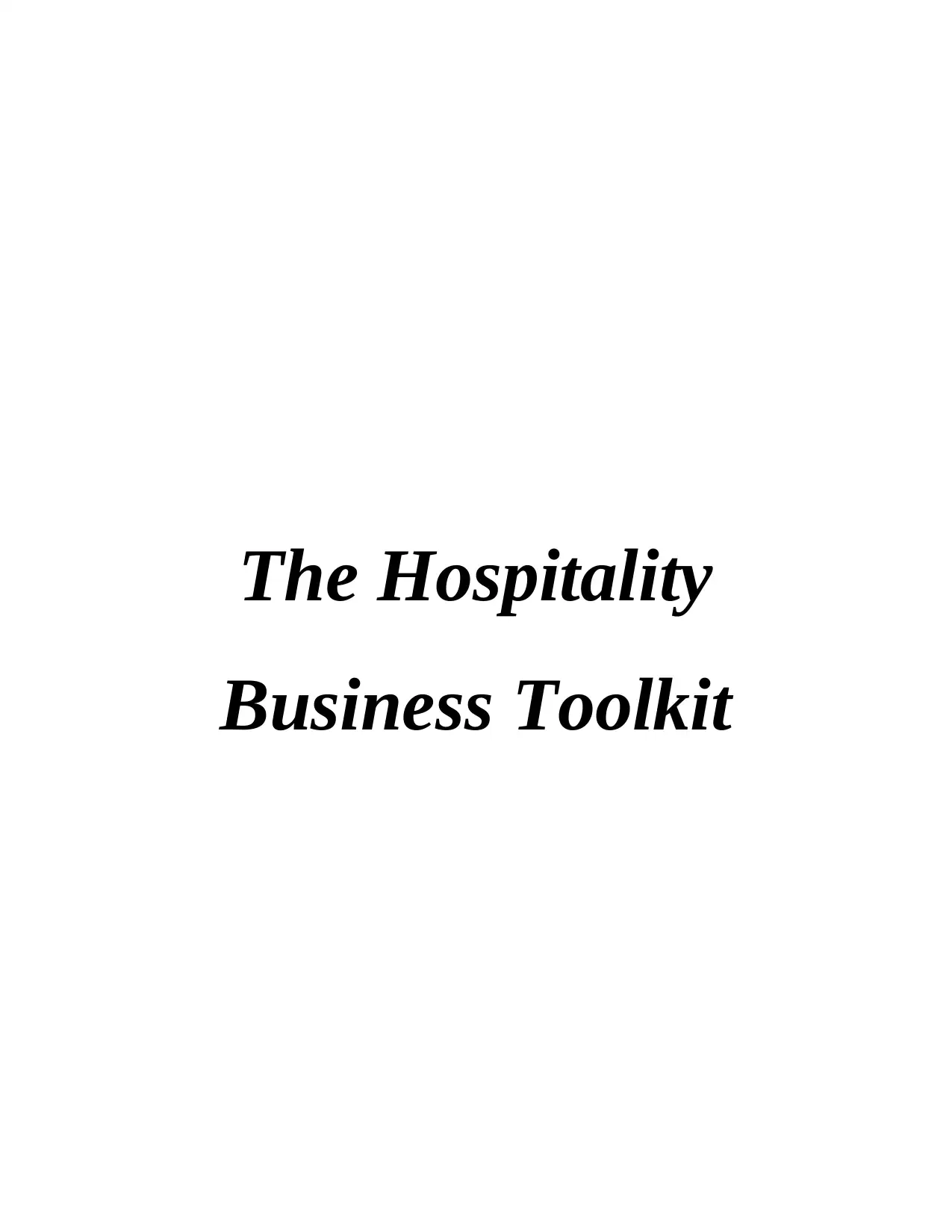
The Hospitality
Business Toolkit
Business Toolkit
Paraphrase This Document
Need a fresh take? Get an instant paraphrase of this document with our AI Paraphraser

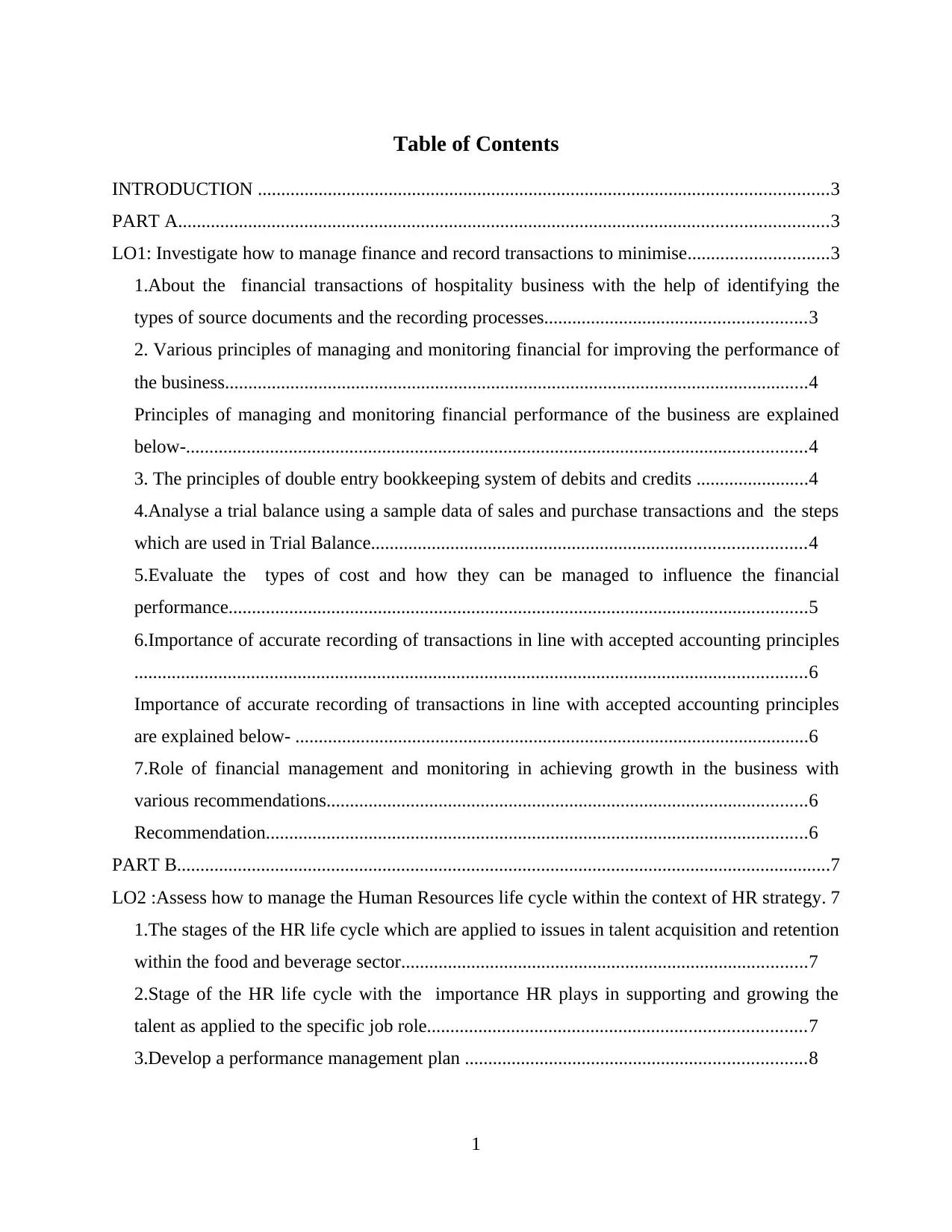
Table of Contents
INTRODUCTION ..........................................................................................................................3
PART A...........................................................................................................................................3
LO1: Investigate how to manage finance and record transactions to minimise..............................3
1.About the financial transactions of hospitality business with the help of identifying the
types of source documents and the recording processes........................................................3
2. Various principles of managing and monitoring financial for improving the performance of
the business.............................................................................................................................4
Principles of managing and monitoring financial performance of the business are explained
below-.....................................................................................................................................4
3. The principles of double entry bookkeeping system of debits and credits ........................4
4.Analyse a trial balance using a sample data of sales and purchase transactions and the steps
which are used in Trial Balance.............................................................................................4
5.Evaluate the types of cost and how they can be managed to influence the financial
performance............................................................................................................................5
6.Importance of accurate recording of transactions in line with accepted accounting principles
................................................................................................................................................6
Importance of accurate recording of transactions in line with accepted accounting principles
are explained below- ..............................................................................................................6
7.Role of financial management and monitoring in achieving growth in the business with
various recommendations.......................................................................................................6
Recommendation....................................................................................................................6
PART B............................................................................................................................................7
LO2 :Assess how to manage the Human Resources life cycle within the context of HR strategy. 7
1.The stages of the HR life cycle which are applied to issues in talent acquisition and retention
within the food and beverage sector.......................................................................................7
2.Stage of the HR life cycle with the importance HR plays in supporting and growing the
talent as applied to the specific job role.................................................................................7
3.Develop a performance management plan .........................................................................8
1
INTRODUCTION ..........................................................................................................................3
PART A...........................................................................................................................................3
LO1: Investigate how to manage finance and record transactions to minimise..............................3
1.About the financial transactions of hospitality business with the help of identifying the
types of source documents and the recording processes........................................................3
2. Various principles of managing and monitoring financial for improving the performance of
the business.............................................................................................................................4
Principles of managing and monitoring financial performance of the business are explained
below-.....................................................................................................................................4
3. The principles of double entry bookkeeping system of debits and credits ........................4
4.Analyse a trial balance using a sample data of sales and purchase transactions and the steps
which are used in Trial Balance.............................................................................................4
5.Evaluate the types of cost and how they can be managed to influence the financial
performance............................................................................................................................5
6.Importance of accurate recording of transactions in line with accepted accounting principles
................................................................................................................................................6
Importance of accurate recording of transactions in line with accepted accounting principles
are explained below- ..............................................................................................................6
7.Role of financial management and monitoring in achieving growth in the business with
various recommendations.......................................................................................................6
Recommendation....................................................................................................................6
PART B............................................................................................................................................7
LO2 :Assess how to manage the Human Resources life cycle within the context of HR strategy. 7
1.The stages of the HR life cycle which are applied to issues in talent acquisition and retention
within the food and beverage sector.......................................................................................7
2.Stage of the HR life cycle with the importance HR plays in supporting and growing the
talent as applied to the specific job role.................................................................................7
3.Develop a performance management plan .........................................................................8
1
⊘ This is a preview!⊘
Do you want full access?
Subscribe today to unlock all pages.

Trusted by 1+ million students worldwide
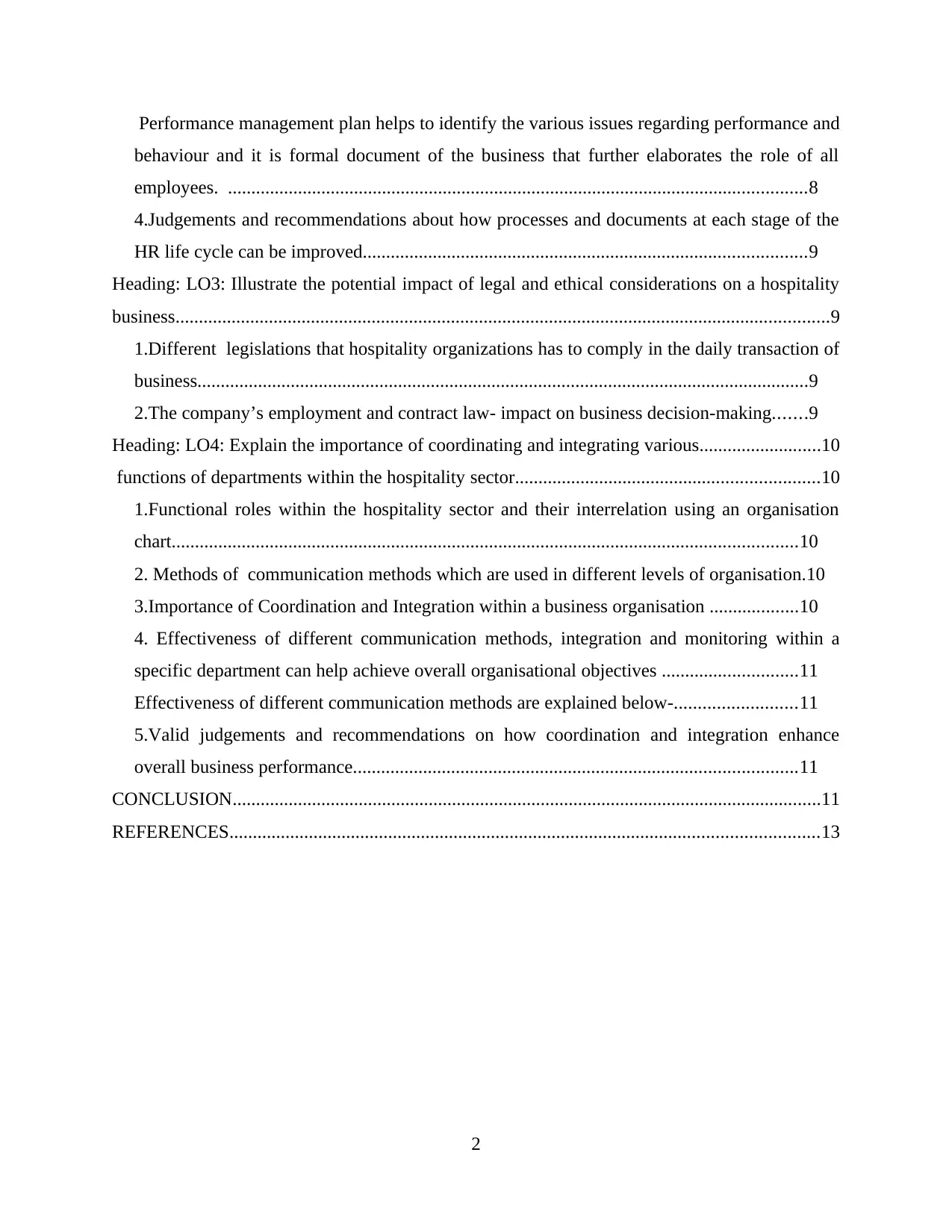
Performance management plan helps to identify the various issues regarding performance and
behaviour and it is formal document of the business that further elaborates the role of all
employees. ............................................................................................................................8
4.Judgements and recommendations about how processes and documents at each stage of the
HR life cycle can be improved...............................................................................................9
Heading: LO3: Illustrate the potential impact of legal and ethical considerations on a hospitality
business............................................................................................................................................9
1.Different legislations that hospitality organizations has to comply in the daily transaction of
business...................................................................................................................................9
2.The company’s employment and contract law- impact on business decision-making.......9
Heading: LO4: Explain the importance of coordinating and integrating various..........................10
functions of departments within the hospitality sector.................................................................10
1.Functional roles within the hospitality sector and their interrelation using an organisation
chart......................................................................................................................................10
2. Methods of communication methods which are used in different levels of organisation.10
3.Importance of Coordination and Integration within a business organisation ...................10
4. Effectiveness of different communication methods, integration and monitoring within a
specific department can help achieve overall organisational objectives .............................11
Effectiveness of different communication methods are explained below-..........................11
5.Valid judgements and recommendations on how coordination and integration enhance
overall business performance...............................................................................................11
CONCLUSION..............................................................................................................................11
REFERENCES..............................................................................................................................13
2
behaviour and it is formal document of the business that further elaborates the role of all
employees. ............................................................................................................................8
4.Judgements and recommendations about how processes and documents at each stage of the
HR life cycle can be improved...............................................................................................9
Heading: LO3: Illustrate the potential impact of legal and ethical considerations on a hospitality
business............................................................................................................................................9
1.Different legislations that hospitality organizations has to comply in the daily transaction of
business...................................................................................................................................9
2.The company’s employment and contract law- impact on business decision-making.......9
Heading: LO4: Explain the importance of coordinating and integrating various..........................10
functions of departments within the hospitality sector.................................................................10
1.Functional roles within the hospitality sector and their interrelation using an organisation
chart......................................................................................................................................10
2. Methods of communication methods which are used in different levels of organisation.10
3.Importance of Coordination and Integration within a business organisation ...................10
4. Effectiveness of different communication methods, integration and monitoring within a
specific department can help achieve overall organisational objectives .............................11
Effectiveness of different communication methods are explained below-..........................11
5.Valid judgements and recommendations on how coordination and integration enhance
overall business performance...............................................................................................11
CONCLUSION..............................................................................................................................11
REFERENCES..............................................................................................................................13
2
Paraphrase This Document
Need a fresh take? Get an instant paraphrase of this document with our AI Paraphraser
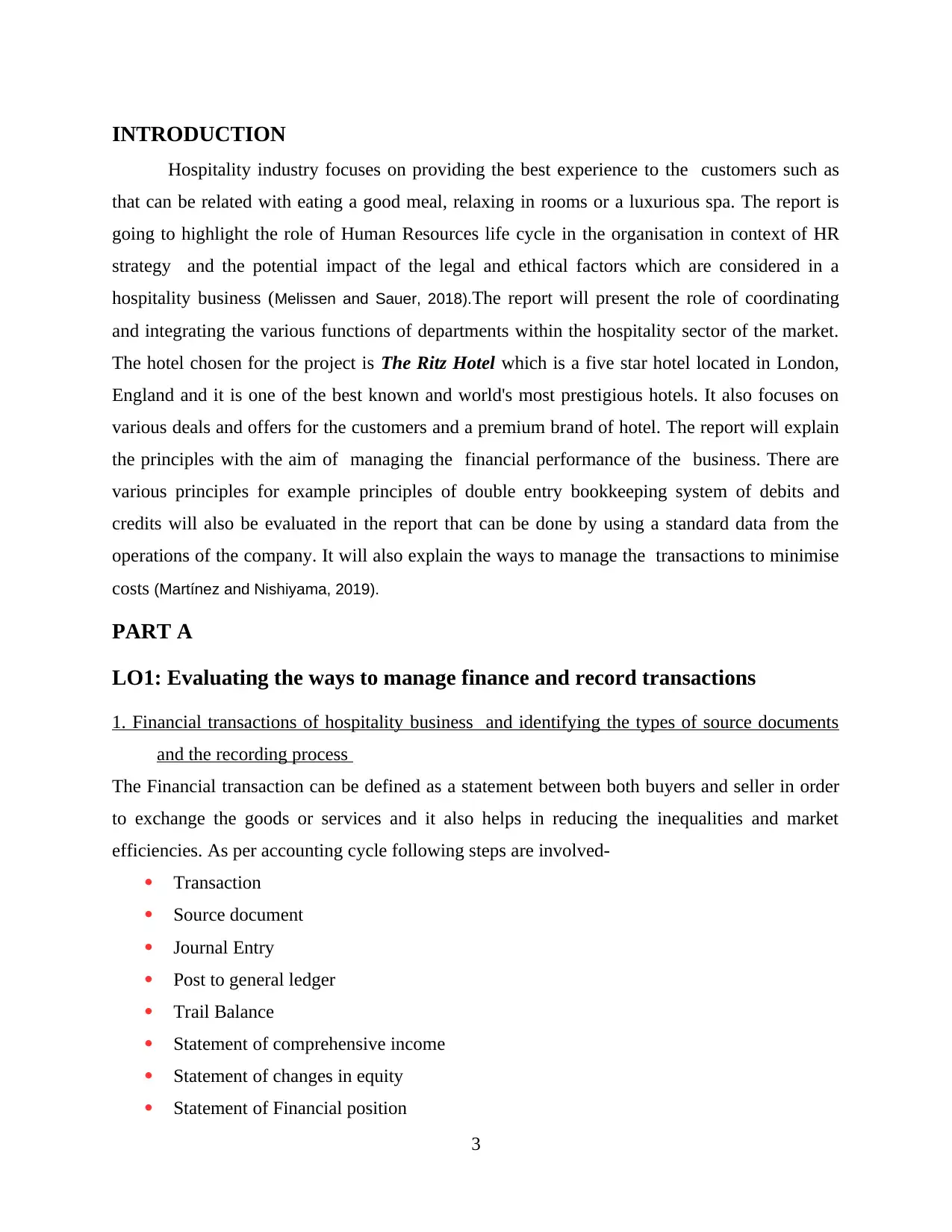
INTRODUCTION
Hospitality industry focuses on providing the best experience to the customers such as
that can be related with eating a good meal, relaxing in rooms or a luxurious spa. The report is
going to highlight the role of Human Resources life cycle in the organisation in context of HR
strategy and the potential impact of the legal and ethical factors which are considered in a
hospitality business (Melissen and Sauer, 2018).The report will present the role of coordinating
and integrating the various functions of departments within the hospitality sector of the market.
The hotel chosen for the project is The Ritz Hotel which is a five star hotel located in London,
England and it is one of the best known and world's most prestigious hotels. It also focuses on
various deals and offers for the customers and a premium brand of hotel. The report will explain
the principles with the aim of managing the financial performance of the business. There are
various principles for example principles of double entry bookkeeping system of debits and
credits will also be evaluated in the report that can be done by using a standard data from the
operations of the company. It will also explain the ways to manage the transactions to minimise
costs (Martínez and Nishiyama, 2019).
PART A
LO1: Evaluating the ways to manage finance and record transactions
1. Financial transactions of hospitality business and identifying the types of source documents
and the recording process
The Financial transaction can be defined as a statement between both buyers and seller in order
to exchange the goods or services and it also helps in reducing the inequalities and market
efficiencies. As per accounting cycle following steps are involved-
Transaction
Source document
Journal Entry
Post to general ledger
Trail Balance
Statement of comprehensive income
Statement of changes in equity
Statement of Financial position
3
Hospitality industry focuses on providing the best experience to the customers such as
that can be related with eating a good meal, relaxing in rooms or a luxurious spa. The report is
going to highlight the role of Human Resources life cycle in the organisation in context of HR
strategy and the potential impact of the legal and ethical factors which are considered in a
hospitality business (Melissen and Sauer, 2018).The report will present the role of coordinating
and integrating the various functions of departments within the hospitality sector of the market.
The hotel chosen for the project is The Ritz Hotel which is a five star hotel located in London,
England and it is one of the best known and world's most prestigious hotels. It also focuses on
various deals and offers for the customers and a premium brand of hotel. The report will explain
the principles with the aim of managing the financial performance of the business. There are
various principles for example principles of double entry bookkeeping system of debits and
credits will also be evaluated in the report that can be done by using a standard data from the
operations of the company. It will also explain the ways to manage the transactions to minimise
costs (Martínez and Nishiyama, 2019).
PART A
LO1: Evaluating the ways to manage finance and record transactions
1. Financial transactions of hospitality business and identifying the types of source documents
and the recording process
The Financial transaction can be defined as a statement between both buyers and seller in order
to exchange the goods or services and it also helps in reducing the inequalities and market
efficiencies. As per accounting cycle following steps are involved-
Transaction
Source document
Journal Entry
Post to general ledger
Trail Balance
Statement of comprehensive income
Statement of changes in equity
Statement of Financial position
3
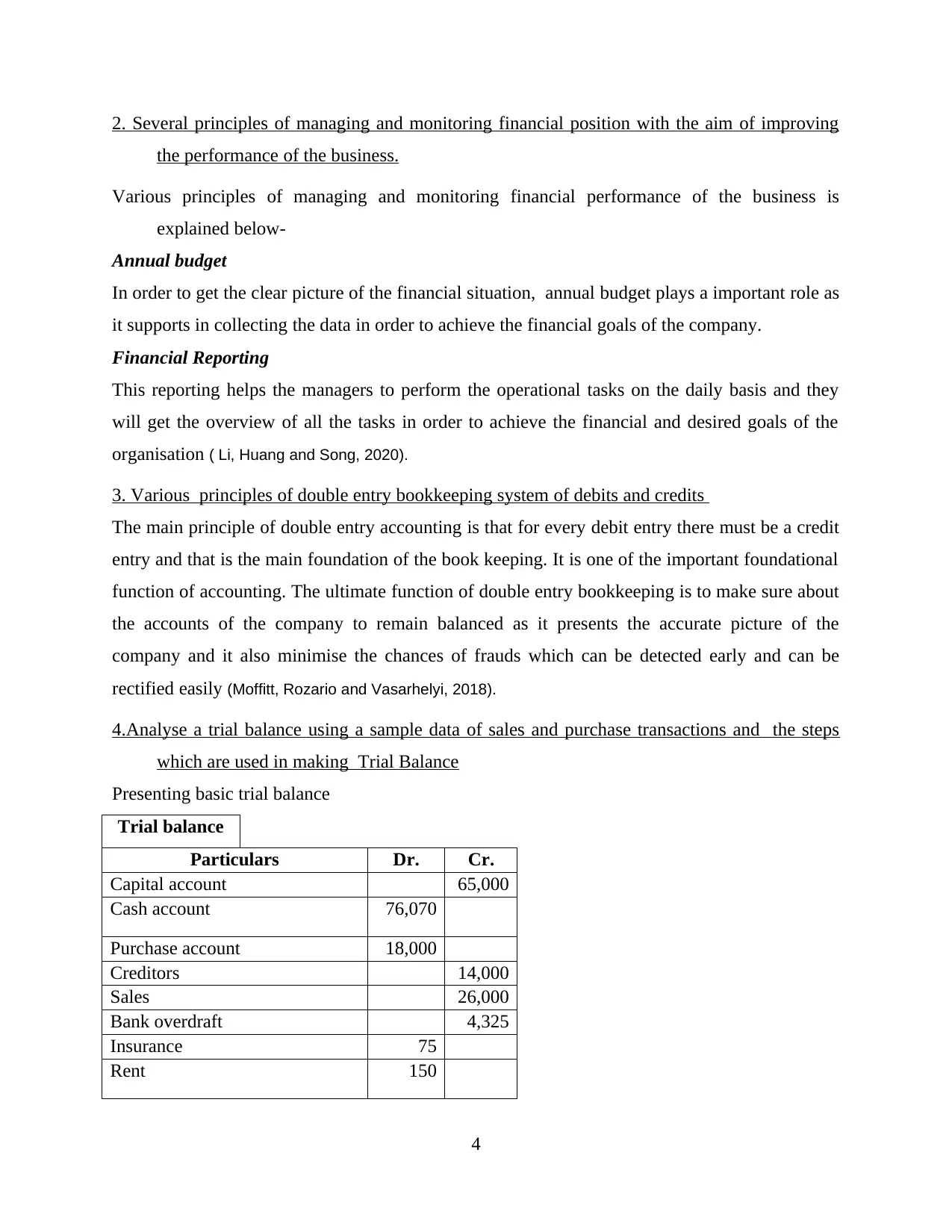
2. Several principles of managing and monitoring financial position with the aim of improving
the performance of the business.
Various principles of managing and monitoring financial performance of the business is
explained below-
Annual budget
In order to get the clear picture of the financial situation, annual budget plays a important role as
it supports in collecting the data in order to achieve the financial goals of the company.
Financial Reporting
This reporting helps the managers to perform the operational tasks on the daily basis and they
will get the overview of all the tasks in order to achieve the financial and desired goals of the
organisation ( Li, Huang and Song, 2020).
3. Various principles of double entry bookkeeping system of debits and credits
The main principle of double entry accounting is that for every debit entry there must be a credit
entry and that is the main foundation of the book keeping. It is one of the important foundational
function of accounting. The ultimate function of double entry bookkeeping is to make sure about
the accounts of the company to remain balanced as it presents the accurate picture of the
company and it also minimise the chances of frauds which can be detected early and can be
rectified easily (Moffitt, Rozario and Vasarhelyi, 2018).
4.Analyse a trial balance using a sample data of sales and purchase transactions and the steps
which are used in making Trial Balance
Presenting basic trial balance
Trial balance
Particulars Dr. Cr.
Capital account 65,000
Cash account 76,070
Purchase account 18,000
Creditors 14,000
Sales 26,000
Bank overdraft 4,325
Insurance 75
Rent 150
4
the performance of the business.
Various principles of managing and monitoring financial performance of the business is
explained below-
Annual budget
In order to get the clear picture of the financial situation, annual budget plays a important role as
it supports in collecting the data in order to achieve the financial goals of the company.
Financial Reporting
This reporting helps the managers to perform the operational tasks on the daily basis and they
will get the overview of all the tasks in order to achieve the financial and desired goals of the
organisation ( Li, Huang and Song, 2020).
3. Various principles of double entry bookkeeping system of debits and credits
The main principle of double entry accounting is that for every debit entry there must be a credit
entry and that is the main foundation of the book keeping. It is one of the important foundational
function of accounting. The ultimate function of double entry bookkeeping is to make sure about
the accounts of the company to remain balanced as it presents the accurate picture of the
company and it also minimise the chances of frauds which can be detected early and can be
rectified easily (Moffitt, Rozario and Vasarhelyi, 2018).
4.Analyse a trial balance using a sample data of sales and purchase transactions and the steps
which are used in making Trial Balance
Presenting basic trial balance
Trial balance
Particulars Dr. Cr.
Capital account 65,000
Cash account 76,070
Purchase account 18,000
Creditors 14,000
Sales 26,000
Bank overdraft 4,325
Insurance 75
Rent 150
4
⊘ This is a preview!⊘
Do you want full access?
Subscribe today to unlock all pages.

Trusted by 1+ million students worldwide
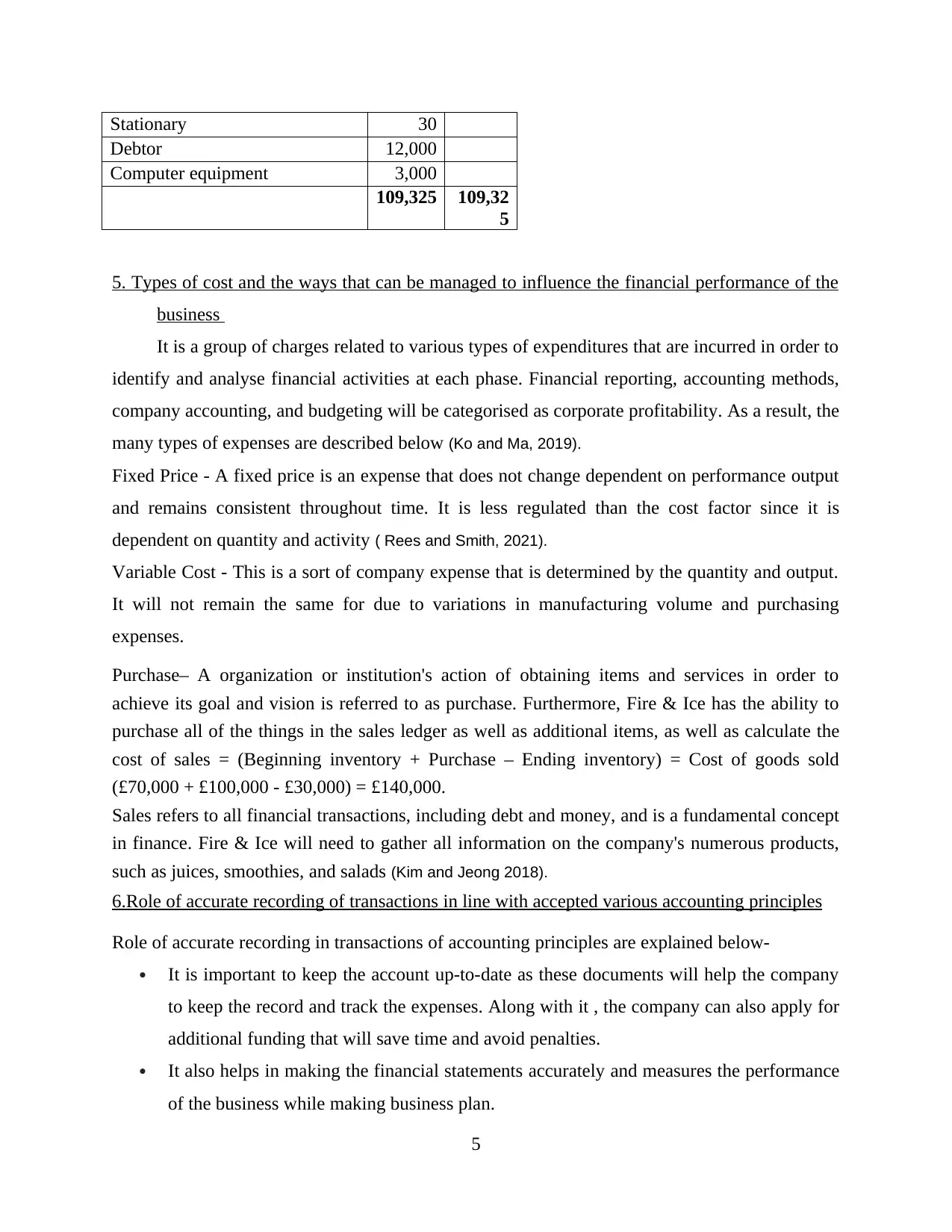
Stationary 30
Debtor 12,000
Computer equipment 3,000
109,325 109,32
5
5. Types of cost and the ways that can be managed to influence the financial performance of the
business
It is a group of charges related to various types of expenditures that are incurred in order to
identify and analyse financial activities at each phase. Financial reporting, accounting methods,
company accounting, and budgeting will be categorised as corporate profitability. As a result, the
many types of expenses are described below (Ko and Ma, 2019).
Fixed Price - A fixed price is an expense that does not change dependent on performance output
and remains consistent throughout time. It is less regulated than the cost factor since it is
dependent on quantity and activity ( Rees and Smith, 2021).
Variable Cost - This is a sort of company expense that is determined by the quantity and output.
It will not remain the same for due to variations in manufacturing volume and purchasing
expenses.
Purchase– A organization or institution's action of obtaining items and services in order to
achieve its goal and vision is referred to as purchase. Furthermore, Fire & Ice has the ability to
purchase all of the things in the sales ledger as well as additional items, as well as calculate the
cost of sales = (Beginning inventory + Purchase – Ending inventory) = Cost of goods sold
(£70,000 + £100,000 - £30,000) = £140,000.
Sales refers to all financial transactions, including debt and money, and is a fundamental concept
in finance. Fire & Ice will need to gather all information on the company's numerous products,
such as juices, smoothies, and salads (Kim and Jeong 2018).
6.Role of accurate recording of transactions in line with accepted various accounting principles
Role of accurate recording in transactions of accounting principles are explained below-
It is important to keep the account up-to-date as these documents will help the company
to keep the record and track the expenses. Along with it , the company can also apply for
additional funding that will save time and avoid penalties.
It also helps in making the financial statements accurately and measures the performance
of the business while making business plan.
5
Debtor 12,000
Computer equipment 3,000
109,325 109,32
5
5. Types of cost and the ways that can be managed to influence the financial performance of the
business
It is a group of charges related to various types of expenditures that are incurred in order to
identify and analyse financial activities at each phase. Financial reporting, accounting methods,
company accounting, and budgeting will be categorised as corporate profitability. As a result, the
many types of expenses are described below (Ko and Ma, 2019).
Fixed Price - A fixed price is an expense that does not change dependent on performance output
and remains consistent throughout time. It is less regulated than the cost factor since it is
dependent on quantity and activity ( Rees and Smith, 2021).
Variable Cost - This is a sort of company expense that is determined by the quantity and output.
It will not remain the same for due to variations in manufacturing volume and purchasing
expenses.
Purchase– A organization or institution's action of obtaining items and services in order to
achieve its goal and vision is referred to as purchase. Furthermore, Fire & Ice has the ability to
purchase all of the things in the sales ledger as well as additional items, as well as calculate the
cost of sales = (Beginning inventory + Purchase – Ending inventory) = Cost of goods sold
(£70,000 + £100,000 - £30,000) = £140,000.
Sales refers to all financial transactions, including debt and money, and is a fundamental concept
in finance. Fire & Ice will need to gather all information on the company's numerous products,
such as juices, smoothies, and salads (Kim and Jeong 2018).
6.Role of accurate recording of transactions in line with accepted various accounting principles
Role of accurate recording in transactions of accounting principles are explained below-
It is important to keep the account up-to-date as these documents will help the company
to keep the record and track the expenses. Along with it , the company can also apply for
additional funding that will save time and avoid penalties.
It also helps in making the financial statements accurately and measures the performance
of the business while making business plan.
5
Paraphrase This Document
Need a fresh take? Get an instant paraphrase of this document with our AI Paraphraser
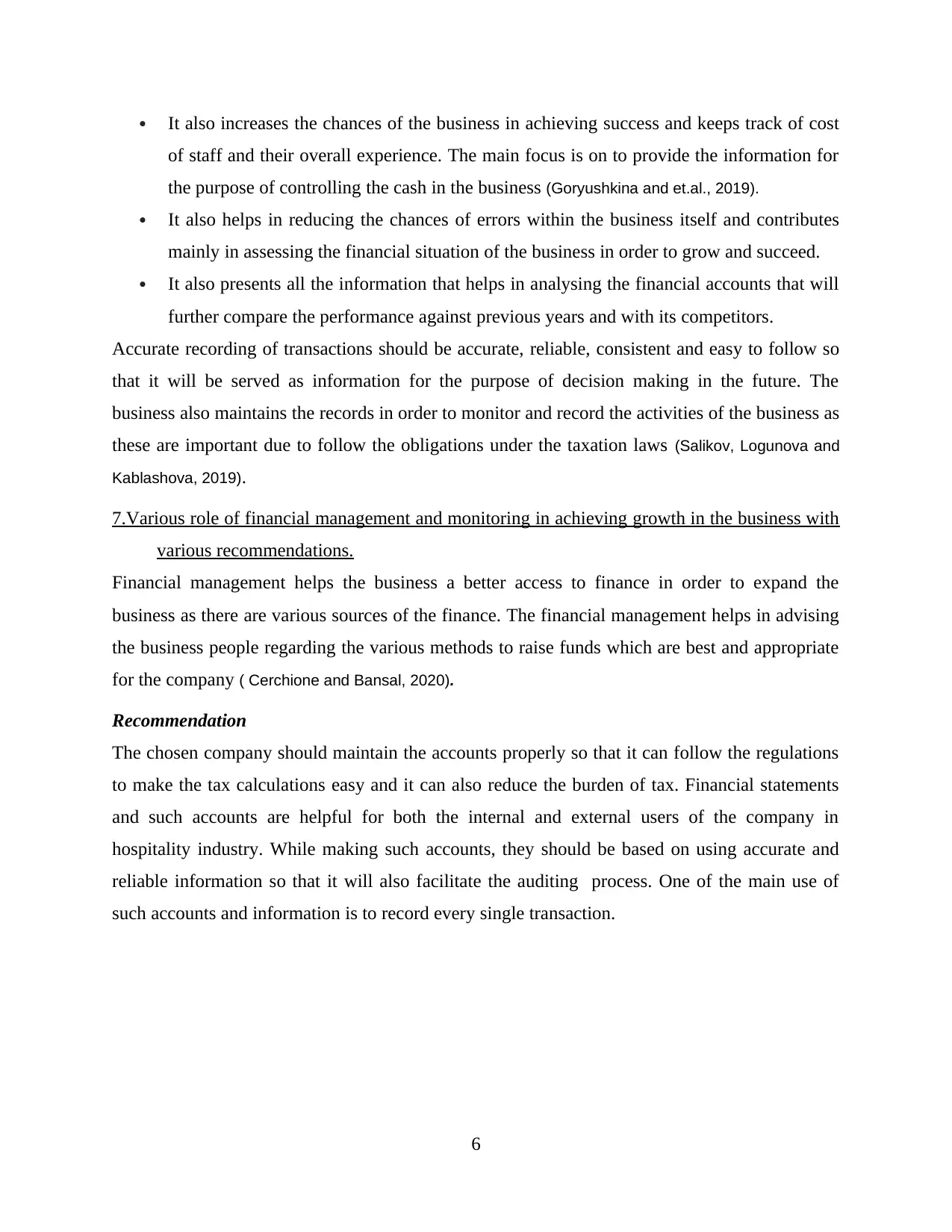
It also increases the chances of the business in achieving success and keeps track of cost
of staff and their overall experience. The main focus is on to provide the information for
the purpose of controlling the cash in the business (Goryushkina and et.al., 2019).
It also helps in reducing the chances of errors within the business itself and contributes
mainly in assessing the financial situation of the business in order to grow and succeed.
It also presents all the information that helps in analysing the financial accounts that will
further compare the performance against previous years and with its competitors.
Accurate recording of transactions should be accurate, reliable, consistent and easy to follow so
that it will be served as information for the purpose of decision making in the future. The
business also maintains the records in order to monitor and record the activities of the business as
these are important due to follow the obligations under the taxation laws (Salikov, Logunova and
Kablashova, 2019).
7.Various role of financial management and monitoring in achieving growth in the business with
various recommendations.
Financial management helps the business a better access to finance in order to expand the
business as there are various sources of the finance. The financial management helps in advising
the business people regarding the various methods to raise funds which are best and appropriate
for the company ( Cerchione and Bansal, 2020).
Recommendation
The chosen company should maintain the accounts properly so that it can follow the regulations
to make the tax calculations easy and it can also reduce the burden of tax. Financial statements
and such accounts are helpful for both the internal and external users of the company in
hospitality industry. While making such accounts, they should be based on using accurate and
reliable information so that it will also facilitate the auditing process. One of the main use of
such accounts and information is to record every single transaction.
6
of staff and their overall experience. The main focus is on to provide the information for
the purpose of controlling the cash in the business (Goryushkina and et.al., 2019).
It also helps in reducing the chances of errors within the business itself and contributes
mainly in assessing the financial situation of the business in order to grow and succeed.
It also presents all the information that helps in analysing the financial accounts that will
further compare the performance against previous years and with its competitors.
Accurate recording of transactions should be accurate, reliable, consistent and easy to follow so
that it will be served as information for the purpose of decision making in the future. The
business also maintains the records in order to monitor and record the activities of the business as
these are important due to follow the obligations under the taxation laws (Salikov, Logunova and
Kablashova, 2019).
7.Various role of financial management and monitoring in achieving growth in the business with
various recommendations.
Financial management helps the business a better access to finance in order to expand the
business as there are various sources of the finance. The financial management helps in advising
the business people regarding the various methods to raise funds which are best and appropriate
for the company ( Cerchione and Bansal, 2020).
Recommendation
The chosen company should maintain the accounts properly so that it can follow the regulations
to make the tax calculations easy and it can also reduce the burden of tax. Financial statements
and such accounts are helpful for both the internal and external users of the company in
hospitality industry. While making such accounts, they should be based on using accurate and
reliable information so that it will also facilitate the auditing process. One of the main use of
such accounts and information is to record every single transaction.
6
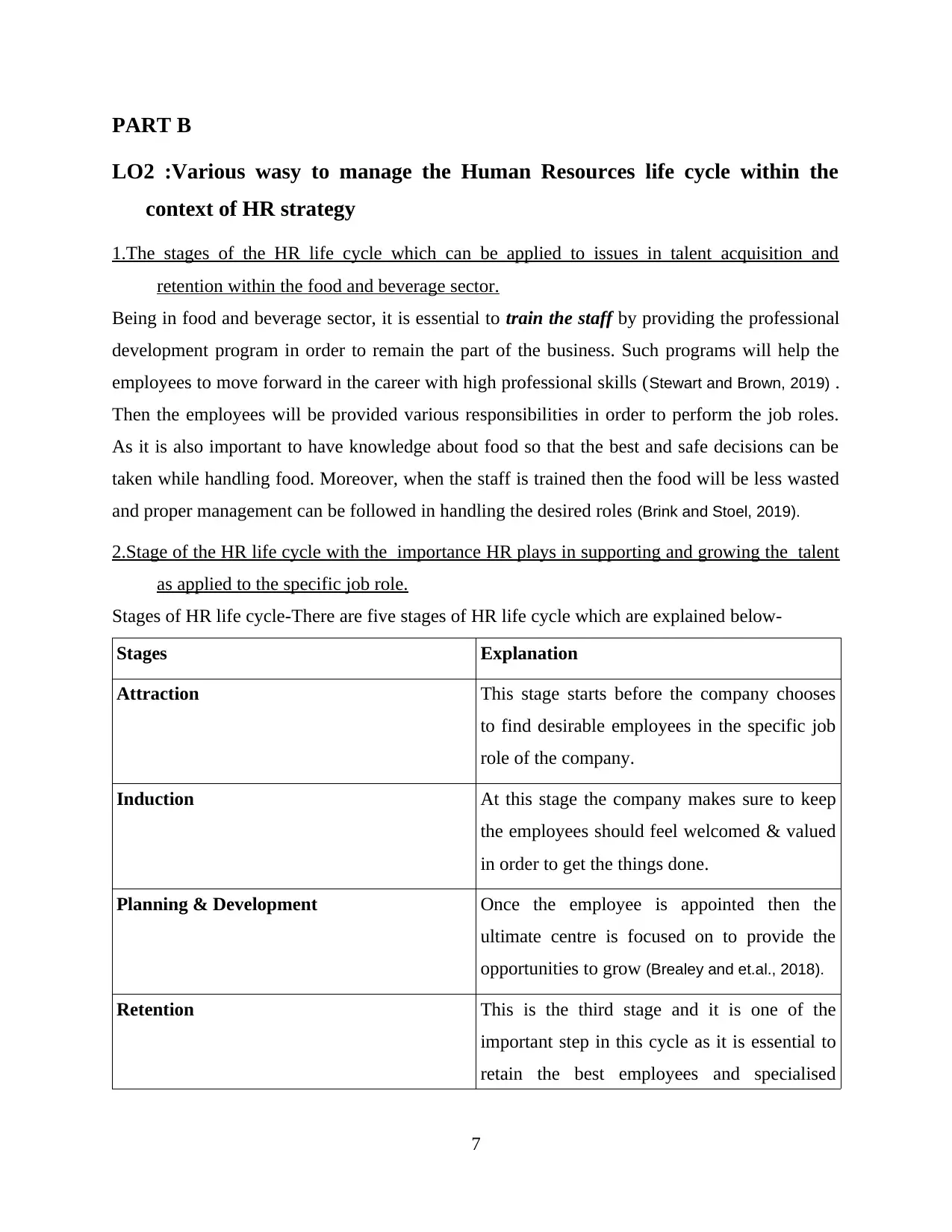
PART B
LO2 :Various wasy to manage the Human Resources life cycle within the
context of HR strategy
1.The stages of the HR life cycle which can be applied to issues in talent acquisition and
retention within the food and beverage sector.
Being in food and beverage sector, it is essential to train the staff by providing the professional
development program in order to remain the part of the business. Such programs will help the
employees to move forward in the career with high professional skills (Stewart and Brown, 2019) .
Then the employees will be provided various responsibilities in order to perform the job roles.
As it is also important to have knowledge about food so that the best and safe decisions can be
taken while handling food. Moreover, when the staff is trained then the food will be less wasted
and proper management can be followed in handling the desired roles (Brink and Stoel, 2019).
2.Stage of the HR life cycle with the importance HR plays in supporting and growing the talent
as applied to the specific job role.
Stages of HR life cycle-There are five stages of HR life cycle which are explained below-
Stages Explanation
Attraction This stage starts before the company chooses
to find desirable employees in the specific job
role of the company.
Induction At this stage the company makes sure to keep
the employees should feel welcomed & valued
in order to get the things done.
Planning & Development Once the employee is appointed then the
ultimate centre is focused on to provide the
opportunities to grow (Brealey and et.al., 2018).
Retention This is the third stage and it is one of the
important step in this cycle as it is essential to
retain the best employees and specialised
7
LO2 :Various wasy to manage the Human Resources life cycle within the
context of HR strategy
1.The stages of the HR life cycle which can be applied to issues in talent acquisition and
retention within the food and beverage sector.
Being in food and beverage sector, it is essential to train the staff by providing the professional
development program in order to remain the part of the business. Such programs will help the
employees to move forward in the career with high professional skills (Stewart and Brown, 2019) .
Then the employees will be provided various responsibilities in order to perform the job roles.
As it is also important to have knowledge about food so that the best and safe decisions can be
taken while handling food. Moreover, when the staff is trained then the food will be less wasted
and proper management can be followed in handling the desired roles (Brink and Stoel, 2019).
2.Stage of the HR life cycle with the importance HR plays in supporting and growing the talent
as applied to the specific job role.
Stages of HR life cycle-There are five stages of HR life cycle which are explained below-
Stages Explanation
Attraction This stage starts before the company chooses
to find desirable employees in the specific job
role of the company.
Induction At this stage the company makes sure to keep
the employees should feel welcomed & valued
in order to get the things done.
Planning & Development Once the employee is appointed then the
ultimate centre is focused on to provide the
opportunities to grow (Brealey and et.al., 2018).
Retention This is the third stage and it is one of the
important step in this cycle as it is essential to
retain the best employees and specialised
7
⊘ This is a preview!⊘
Do you want full access?
Subscribe today to unlock all pages.

Trusted by 1+ million students worldwide
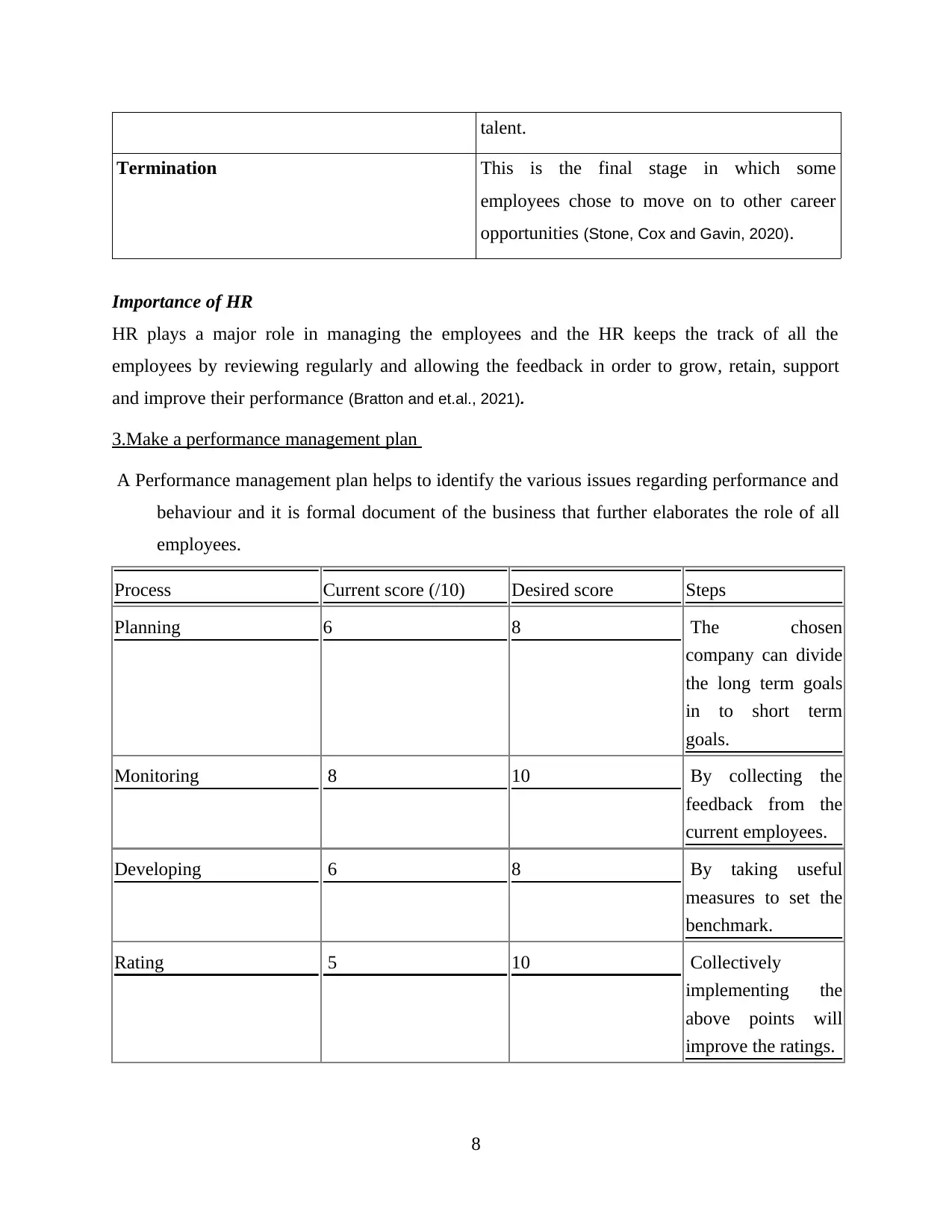
talent.
Termination This is the final stage in which some
employees chose to move on to other career
opportunities (Stone, Cox and Gavin, 2020).
Importance of HR
HR plays a major role in managing the employees and the HR keeps the track of all the
employees by reviewing regularly and allowing the feedback in order to grow, retain, support
and improve their performance (Bratton and et.al., 2021).
3.Make a performance management plan
A Performance management plan helps to identify the various issues regarding performance and
behaviour and it is formal document of the business that further elaborates the role of all
employees.
Process Current score (/10) Desired score Steps
Planning 6 8 The chosen
company can divide
the long term goals
in to short term
goals.
Monitoring 8 10 By collecting the
feedback from the
current employees.
Developing 6 8 By taking useful
measures to set the
benchmark.
Rating 5 10 Collectively
implementing the
above points will
improve the ratings.
8
Termination This is the final stage in which some
employees chose to move on to other career
opportunities (Stone, Cox and Gavin, 2020).
Importance of HR
HR plays a major role in managing the employees and the HR keeps the track of all the
employees by reviewing regularly and allowing the feedback in order to grow, retain, support
and improve their performance (Bratton and et.al., 2021).
3.Make a performance management plan
A Performance management plan helps to identify the various issues regarding performance and
behaviour and it is formal document of the business that further elaborates the role of all
employees.
Process Current score (/10) Desired score Steps
Planning 6 8 The chosen
company can divide
the long term goals
in to short term
goals.
Monitoring 8 10 By collecting the
feedback from the
current employees.
Developing 6 8 By taking useful
measures to set the
benchmark.
Rating 5 10 Collectively
implementing the
above points will
improve the ratings.
8
Paraphrase This Document
Need a fresh take? Get an instant paraphrase of this document with our AI Paraphraser
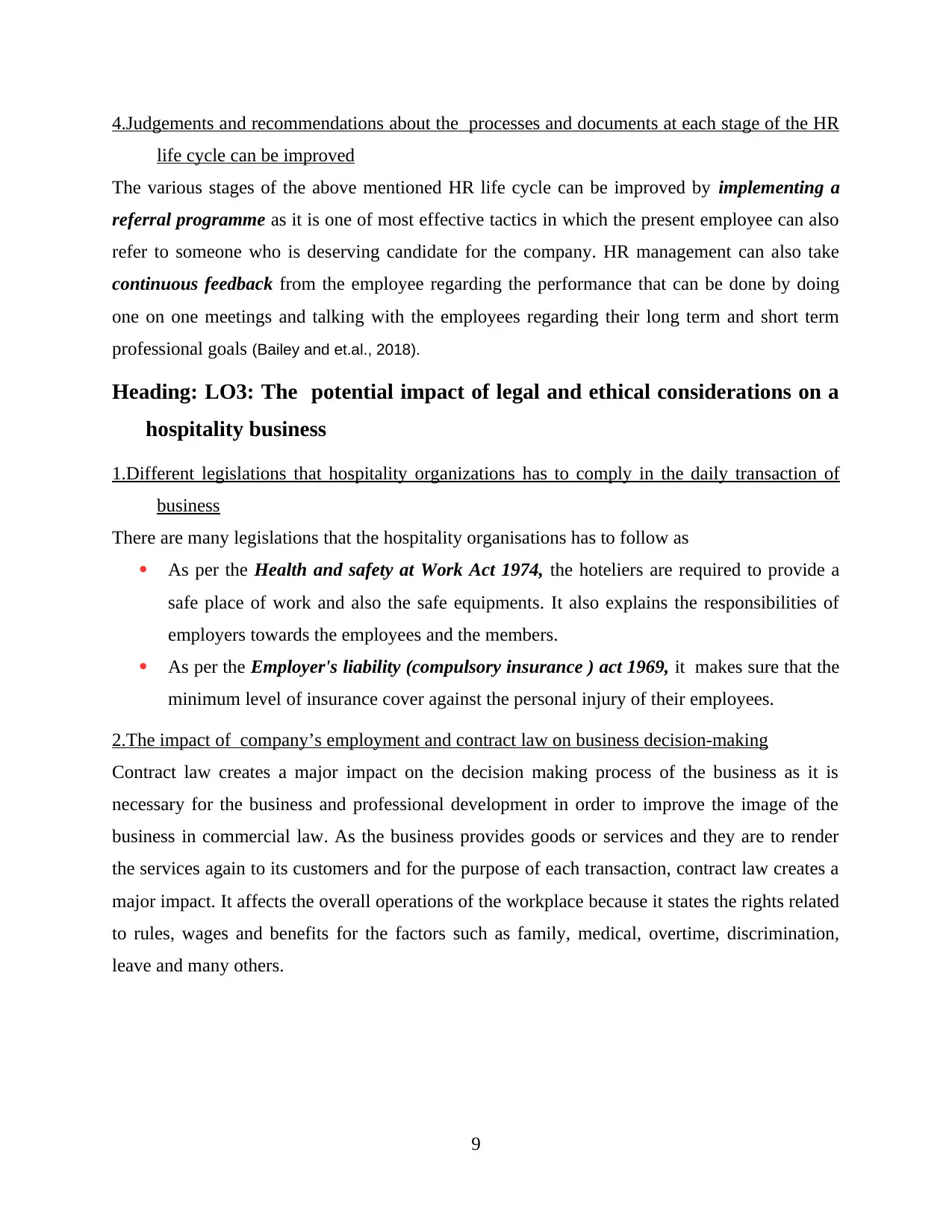
4.Judgements and recommendations about the processes and documents at each stage of the HR
life cycle can be improved
The various stages of the above mentioned HR life cycle can be improved by implementing a
referral programme as it is one of most effective tactics in which the present employee can also
refer to someone who is deserving candidate for the company. HR management can also take
continuous feedback from the employee regarding the performance that can be done by doing
one on one meetings and talking with the employees regarding their long term and short term
professional goals (Bailey and et.al., 2018).
Heading: LO3: The potential impact of legal and ethical considerations on a
hospitality business
1.Different legislations that hospitality organizations has to comply in the daily transaction of
business
There are many legislations that the hospitality organisations has to follow as
As per the Health and safety at Work Act 1974, the hoteliers are required to provide a
safe place of work and also the safe equipments. It also explains the responsibilities of
employers towards the employees and the members.
As per the Employer's liability (compulsory insurance ) act 1969, it makes sure that the
minimum level of insurance cover against the personal injury of their employees.
2.The impact of company’s employment and contract law on business decision-making
Contract law creates a major impact on the decision making process of the business as it is
necessary for the business and professional development in order to improve the image of the
business in commercial law. As the business provides goods or services and they are to render
the services again to its customers and for the purpose of each transaction, contract law creates a
major impact. It affects the overall operations of the workplace because it states the rights related
to rules, wages and benefits for the factors such as family, medical, overtime, discrimination,
leave and many others.
9
life cycle can be improved
The various stages of the above mentioned HR life cycle can be improved by implementing a
referral programme as it is one of most effective tactics in which the present employee can also
refer to someone who is deserving candidate for the company. HR management can also take
continuous feedback from the employee regarding the performance that can be done by doing
one on one meetings and talking with the employees regarding their long term and short term
professional goals (Bailey and et.al., 2018).
Heading: LO3: The potential impact of legal and ethical considerations on a
hospitality business
1.Different legislations that hospitality organizations has to comply in the daily transaction of
business
There are many legislations that the hospitality organisations has to follow as
As per the Health and safety at Work Act 1974, the hoteliers are required to provide a
safe place of work and also the safe equipments. It also explains the responsibilities of
employers towards the employees and the members.
As per the Employer's liability (compulsory insurance ) act 1969, it makes sure that the
minimum level of insurance cover against the personal injury of their employees.
2.The impact of company’s employment and contract law on business decision-making
Contract law creates a major impact on the decision making process of the business as it is
necessary for the business and professional development in order to improve the image of the
business in commercial law. As the business provides goods or services and they are to render
the services again to its customers and for the purpose of each transaction, contract law creates a
major impact. It affects the overall operations of the workplace because it states the rights related
to rules, wages and benefits for the factors such as family, medical, overtime, discrimination,
leave and many others.
9
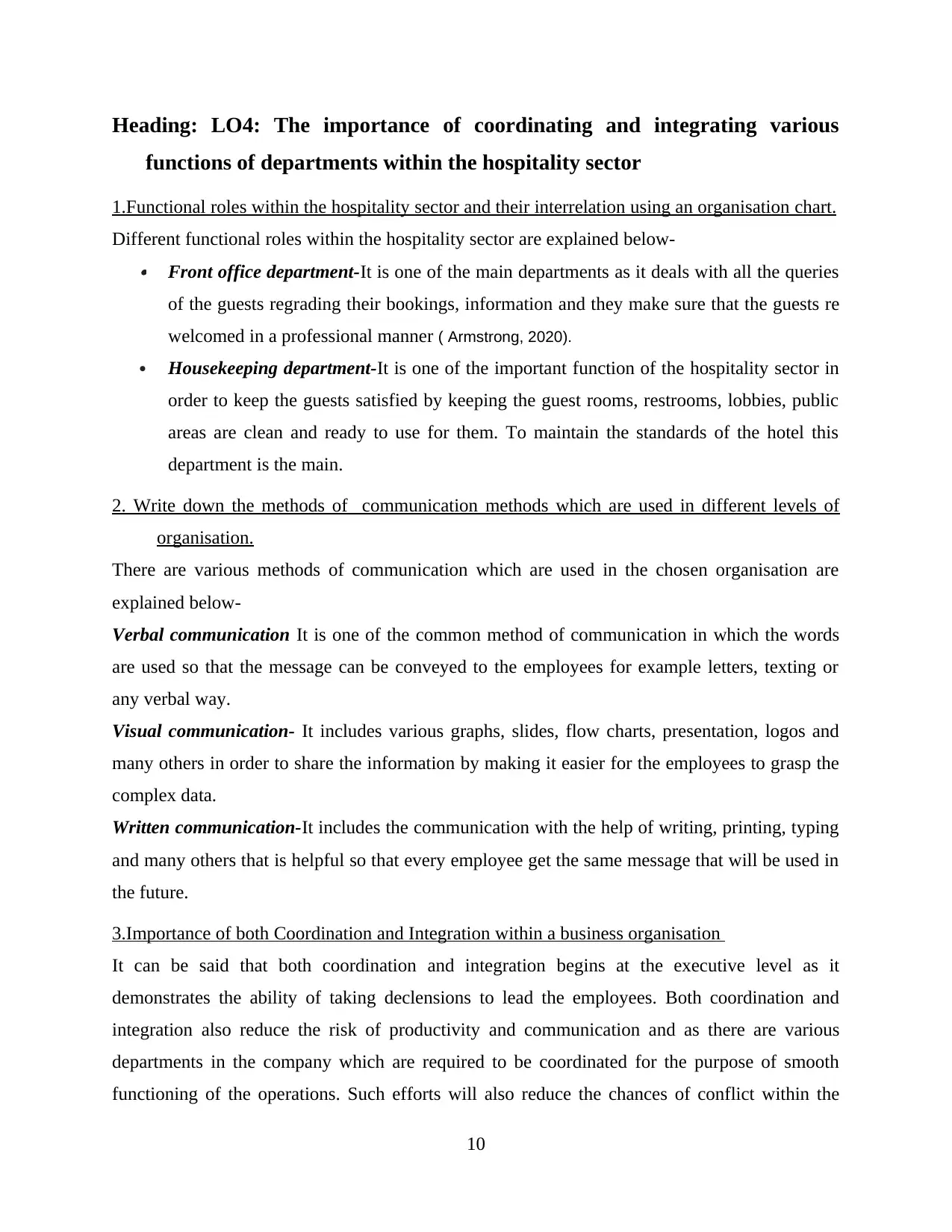
Heading: LO4: The importance of coordinating and integrating various
functions of departments within the hospitality sector
1.Functional roles within the hospitality sector and their interrelation using an organisation chart.
Different functional roles within the hospitality sector are explained below- Front office department-It is one of the main departments as it deals with all the queries
of the guests regrading their bookings, information and they make sure that the guests re
welcomed in a professional manner ( Armstrong, 2020).
Housekeeping department-It is one of the important function of the hospitality sector in
order to keep the guests satisfied by keeping the guest rooms, restrooms, lobbies, public
areas are clean and ready to use for them. To maintain the standards of the hotel this
department is the main.
2. Write down the methods of communication methods which are used in different levels of
organisation.
There are various methods of communication which are used in the chosen organisation are
explained below-
Verbal communication It is one of the common method of communication in which the words
are used so that the message can be conveyed to the employees for example letters, texting or
any verbal way.
Visual communication- It includes various graphs, slides, flow charts, presentation, logos and
many others in order to share the information by making it easier for the employees to grasp the
complex data.
Written communication-It includes the communication with the help of writing, printing, typing
and many others that is helpful so that every employee get the same message that will be used in
the future.
3.Importance of both Coordination and Integration within a business organisation
It can be said that both coordination and integration begins at the executive level as it
demonstrates the ability of taking declensions to lead the employees. Both coordination and
integration also reduce the risk of productivity and communication and as there are various
departments in the company which are required to be coordinated for the purpose of smooth
functioning of the operations. Such efforts will also reduce the chances of conflict within the
10
functions of departments within the hospitality sector
1.Functional roles within the hospitality sector and their interrelation using an organisation chart.
Different functional roles within the hospitality sector are explained below- Front office department-It is one of the main departments as it deals with all the queries
of the guests regrading their bookings, information and they make sure that the guests re
welcomed in a professional manner ( Armstrong, 2020).
Housekeeping department-It is one of the important function of the hospitality sector in
order to keep the guests satisfied by keeping the guest rooms, restrooms, lobbies, public
areas are clean and ready to use for them. To maintain the standards of the hotel this
department is the main.
2. Write down the methods of communication methods which are used in different levels of
organisation.
There are various methods of communication which are used in the chosen organisation are
explained below-
Verbal communication It is one of the common method of communication in which the words
are used so that the message can be conveyed to the employees for example letters, texting or
any verbal way.
Visual communication- It includes various graphs, slides, flow charts, presentation, logos and
many others in order to share the information by making it easier for the employees to grasp the
complex data.
Written communication-It includes the communication with the help of writing, printing, typing
and many others that is helpful so that every employee get the same message that will be used in
the future.
3.Importance of both Coordination and Integration within a business organisation
It can be said that both coordination and integration begins at the executive level as it
demonstrates the ability of taking declensions to lead the employees. Both coordination and
integration also reduce the risk of productivity and communication and as there are various
departments in the company which are required to be coordinated for the purpose of smooth
functioning of the operations. Such efforts will also reduce the chances of conflict within the
10
⊘ This is a preview!⊘
Do you want full access?
Subscribe today to unlock all pages.

Trusted by 1+ million students worldwide
1 out of 15
Related Documents
Your All-in-One AI-Powered Toolkit for Academic Success.
+13062052269
info@desklib.com
Available 24*7 on WhatsApp / Email
![[object Object]](/_next/static/media/star-bottom.7253800d.svg)
Unlock your academic potential
Copyright © 2020–2026 A2Z Services. All Rights Reserved. Developed and managed by ZUCOL.


